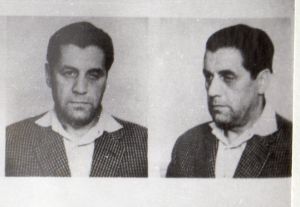Dorohucza

Robert Juhrs
Statement
Special Commission of the Bavarian Regional CID
Frankfurt am Main – 11 October 1961
Dorohucza
At the end of February or the beginning of March 1943, I together with Zierke, Schluch and probably with Tauscher or Schwartz, was transferred to Dorohucza. At the time of my transfer the operation in Belzec had not yet ended. In Dorohucza there was a work camp where the prisoners worked at cutting peat. Dorohucza lay about 6km from Trawniki. At the time we lived and ate in Trawniki.
The work brigade in Dorohucza was about 150-
Shortly after that we were surprised one morning to find our camp surrounded by a police unit. I distinctly remember that there was a thick fog that morning. Our sentries had detected figures in the fog and had given the alarm, as they reckoned there would be a partisan attack on the camp. Shortly afterwards, a police officer in uniform came into our camp, he was accompanied by another man, who could have been from the SD. I no longer know exactly. As I remember, the police officer had the rank of a lieutenant, as I think, he wore at least one star on his shoulder tab. In a rigorous way he ordered all the German personnel to step outside and lay down their arms. He also demanded the same of the other guards.
We were forced to obey this order, after this had been done, all the Jews had to leave the barracks and fall in. I can remember still that our cook – a Jewess from Leipzig, whose name I have forgotten – asked me what it all meant. I told her that I did not know and was also surprised. I had the impression that the Jews, from past experiences, had a premonition of the impending operation. After the Jews were all formed up outside, their living quarters were searched. Then the Jews were moved off in the direction of Trawniki under guard by the police unit. I learned later that all the Jews in this work brigade had been shot in the area of the Kommandantura, in the so-
A few days after this operation, a new movement order to Sobibor arrived for us from Lublin, and we were fetched in lorries. On my arrival in Sobibor the gassing operation there had already ended and the camp partly dismantled.
I was employed there only at cleaning up the place. At the beginning of December 1943 I went to Berlin and on 10 December received home leave.
Between Christmas and New Year 1943-
SOURCES:
Bundesarchiv Ludwigsburg – 208-
Photograph - Ghetto Fighters House, Israel
© Holocaust Historical Society 2016

